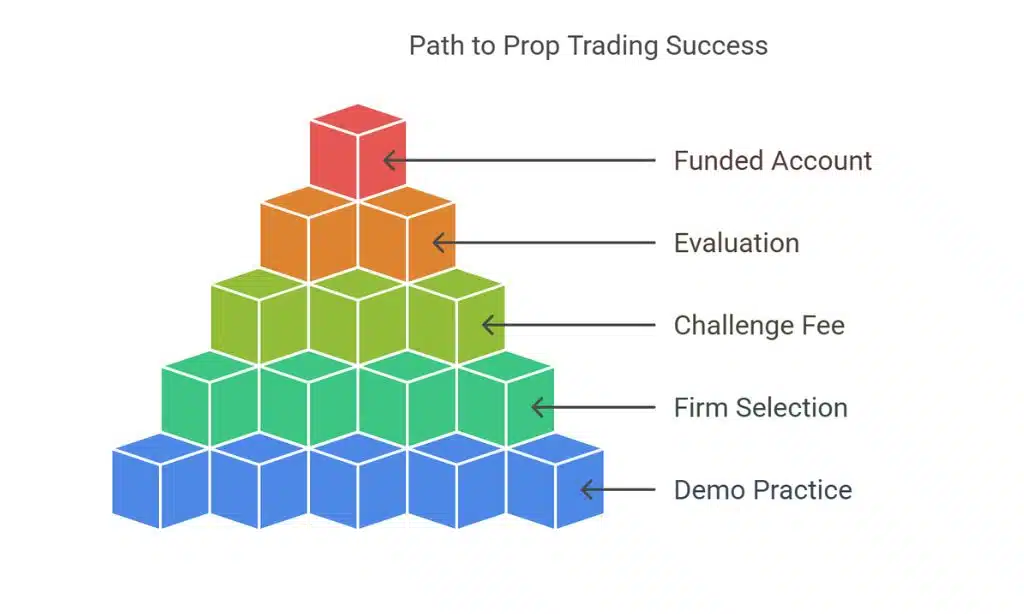Proprietary trading firms, commonly known as *prop firms*, are financial institutions that allow traders to use the firm’s capital to trade various financial instruments such as stocks, forex, commodities, and derivatives. Unlike traditional brokers, prop firms do not rely on client funds; instead, they aim to generate profits using their own resources. This model enables traders to access significant capital without risking their personal funds while earning a share of the profits from successful trades.
Key Features of Prop Trading
- Profit Sharing: Traders typically keep a percentage of the profits they generate, often ranging from 70% to 90%.
- Risk Management: Firms implement strict rules regarding drawdowns and losses to protect their capital.
- Evaluation Process: Most prop firms require traders to pass a challenge or evaluation phase to demonstrate their trading skills before granting access to funded accounts.
- Advanced Tools: Prop firms provide access to sophisticated trading platforms and software, offering a competitive edge over retail traders.
How to Join a Proprietary Trading Firm
Joining a prop firm involves several steps designed to assess your trading capabilities and ensure you align with the firm’s risk management policies. Here’s a step-by-step guide:
1. Practice in a Demo Account
Before applying, hone your trading skills in a demo account. Aim for consistent profitability—such as achieving 5% monthly returns—while managing risk effectively. This practice prepares you for the challenges of real-money trading and builds confidence.
2. Choose the Right Prop Firm
Research prop firms based on your preferred trading instruments [e.g., forex, stocks, futures]. Evaluate their rules, fees, payout structures, and reputation. Different firms cater to various trading styles, so understanding their offerings is crucial.
3. Sign Up and Pay the Challenge Fee
Most prop firms require an entry fee for their evaluation programs. Fees vary depending on account size and evaluation type. During this phase, you’ll trade in a simulated account under strict guidelines.
4. Pass the Evaluation
Successfully meet the profit targets without breaching loss limits during the evaluation phase. Each firm has its own criteria for passing evaluations, such as hitting specific profit targets while adhering to daily or overall loss limits.
5. Receive a Funded Account
Upon passing the evaluation, you’ll gain access to a funded account where you can trade with real capital provided by the firm. You’ll typically retain a portion of your profits while adhering to ongoing risk management rules.
Examples of Proprietary Trading Firms
Here are three notable proprietary trading firms that cater to diverse trading styles:
FunderPro
This firm offers flexible funding programs with scalable options for traders who prefer forex or other financial instruments. It emphasizes unlimited trading periods and provides competitive profit-sharing arrangements.
Specializing in crypto trading, this firm provides access to advanced tools and platforms designed specifically for cryptocurrency markets. Traders can benefit from high profit splits and streamlined evaluation processes.
TradeDay
Focused on futures trading, this firm offers trader-friendly features such as flexible payouts and professional-grade platforms. It caters to those who prefer futures markets and provides accessible account sizes for all experience levels.
Takeaways
Proprietary trading firms provide an excellent opportunity for skilled traders to access significant capital without risking their own funds. By passing rigorous evaluations and adhering to risk management rules, traders can earn substantial profits while leveraging advanced tools and platforms provided by these firms.
Whether you’re interested in forex, crypto, or futures trading, there’s a prop firm tailored to your style. With proper preparation and research into each firm’s requirements and benefits, you can embark on a rewarding journey in proprietary trading.







































